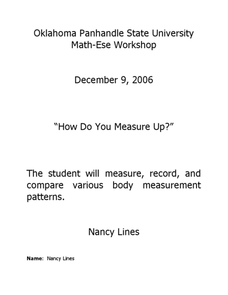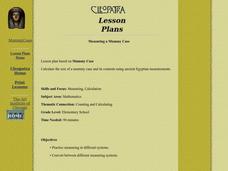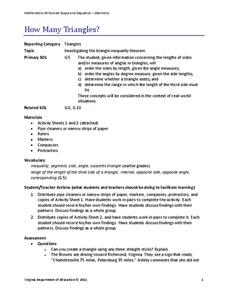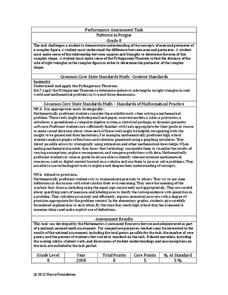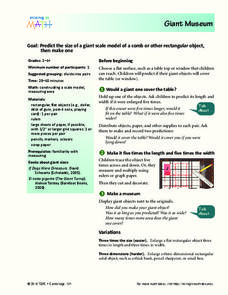Curated OER
Measuring Up with Apples
Second graders estimate and measure various classroom objects using an apple as their tool for measuring, and record their measurement results on a data worksheet.
Curated OER
Measurement: Using the balance
Students use a balance and gram cubes to measure several different objects. They then record their results on a data chart and answer questions about them.
Curated OER
Measurements
In this measurements worksheet, 5th graders practice reading measurements using a thermometer, ruler, and speedometer. Students find the temperature, length, and speed.
Curated OER
To an Inch and Beyond!
Third graders measure in multiples of inches. In this measurement instructional activity, 3rd graders employ a variety of strategies to measure several items in inches.
Curated OER
Tools of the Trade
Third graders explore and identify the tools that can be used to measure length, mass/weight, and volume. They discuss how things are measured using different units, and observe the difference between the English and the Metric systems....
Curated OER
How Do You Measure Up?
Students explore the concept of measurement, modelling the increments on a standard ruler using cubes and grid paper. They identify the length of a line to a designated standard unit and measure specified body parts.
Curated OER
Round About Measurement
In this circumference measurement worksheet, students make a plan for measuring around objects. Students estimate and then measure around a trash basket and pencil holder. Students write if it is easier to measure around an object or a...
Curated OER
Measuring a Mummy Case
Young scholars calculate the size of a mummy case and its contents using ancient Egyptian measurements.
Virginia Department of Education
How Many Triangles?
Something for young mathematicians to remember: the sum of any two sides must be greater than the third. Class members investigates the Triangle Inequality Theorem to find the relationship between the sides of a triangle. At the...
Noyce Foundation
Sewing
Sew up your unit on operations with decimals using this assessment task. Young mathematicians use given rules to determine the amount of fabric they need to sew a pair of pants. They must also fill in a partially complete bill for...
Inside Mathematics
Patterns in Prague
Designers in Prague are not diagonally challenged. The mini-assessment provides a complex pattern made from blocks. Individuals use the pattern to find the area and perimeter of the design. To find the perimeter, they use the Pythagorean...
Mathed Up!
Solving Quadratics by Factorising
Young mathematicians view a video on solving quadratic equations by factoring. They use this skill to complete a learning exercise of practice problems — a great way to gauge understanding!
LABScI
Conservation of Momentum: Marble Collisions
What happens to the momentum of an object when it strikes another object? Scholars roll a marble down a ramp so it collides with another marble. By measuring the speed of each marble before and after the collision, pupils answer this...
Virginia Department of Education
Solar System Model
How many planets can you name? Did you get all 13 in our solar system, including the dwarf planets, or were you surprised when you read there are 13 planets? The lesson helps scholars understand the scale of the universe including the...
101 Questions
Ants Marching
Your classroom will be rockin' during an toe-tapping lesson! Dave Matthews inspires a lesson on proportions as youth listen to a song and predict its length. Lesson materials provide learners with ordered pairs that mark the time slider...
Virginia Department of Education
Heat and Thermal Energy Transfer
How does radiation affect our daily lives? Answer that question and others with a lesson that discusses radiation and its use in thermal energy transfer through electromagnetic waves. Pupils investigate vaporization and...
EngageNY
The Distance from a Point to a Line
What is the fastest way to get from point A to line l? A straight perpendicular line! Learners use what they have learned in the previous lessons in this series and develop a formula for finding the shortest distance from...
Curated OER
Giant Museum
Scholars make a giant scale model of an object. They will take a regular item and enlarge it to five times its length and width. They attempt this same concepts with a 3D model.
Curated OER
Introduction to Measurement
Student observes and measures the variability in the length of the forearm and the length of the foot and to test a common belief that the length of the foot is equal to the length of the forearm.
Curated OER
Wrapped Up In A Kiss!
Students use the wrapper of a Hershey's Kiss to practice estimating, predicting and measuring. They measure with centimeter rulers.
Curated OER
Dizzy Heights
Fifth graders explore ways to measure the height of an inaccessible object. They measure lengths using a tape measure or ruler. Students measure angles using a protractor and estimate heights.
Curated OER
All About Me
Third graders investigate the use of centimeters while measuring items with rulers which they construct. They examine the need for standard units of measure. They estimate the length of body parts before making the actual measurements.
Curated OER
A Lengthy Shake
Third graders practice measuring skills by cutting paper strips of varying lengths. They place them on a parachute and shake it until all the paper strips fall off it. They collect the paper strips and measure them with rulers.
Curated OER
How Long? How Wide?
Second graders distinguish between and use nonstandard and standard units of measurement, use appropriate tools and techniques to measure length and width, and record and interpret data using graphs.





